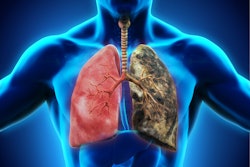Forty percent of cancer cases and almost half of all deaths in the U.S. are linked to disease caused by modifiable risk factors -- and lung cancer tops the list, according to a report issued July 11 by the American Cancer Society (ACS).
A team led by Farhad Islami of the ACS in Atlanta, GA, reported that four in 10 cancer cases could be attributed to risk factors such as cigarette smoking, excess body weight, alcohol consumption, physical inactivity, diet, and infections, with cigarette smoking a leading risk factor, contributing to almost 20% of all cancer cases and 30% of all cancer deaths.
"Despite considerable declines in smoking prevalence during the past few decades, the number of lung cancer deaths attributable to cigarette smoking in the United States is alarming," Islami said in an ACS statement. "This finding underscores the importance of implementing comprehensive tobacco control policies in each state to promote smoking cessation, as well as heightened efforts to increase screening for early detection of lung cancer, when treatment could be more effective."
In 2014, the ACS estimated that 42% of all incident cancer cases and 45% of all cancer deaths in the U.S. could be due to adjustable risk factors. Islami and colleagues conducted this study as an update, estimating the proportion and number of cancer cases and deaths that could be credited to these types of risk factors overall and for 30 cancer types using 2019 data from the Centers for Disease Control and Prevention's National Program of Cancer Registries and the National Cancer Institute's (NCI) Surveillance, Epidemiology, and End Results (SEER) program (they did not use 2020 data due to the effects of COVID on cancer screening).
Risk factors included the following:
- Secondhand smoke
- Excess body weight
- Alcohol consumption
- Consumption of red and processed meat
- Low consumption of fruits and vegetables, dietary fiber, and dietary calcium
- Physical inactivity
- Ultraviolet radiation
- Infection with Epstein-Barr virus, Helicobacter pylori, hepatitis B virus, hepatitis C virus, human herpes virus-8, human immunodeficiency virus (HIV), and human papillomavirus (HPV)
Cigarette smoking had the largest proportion of cancer cases attributable to risk factors in the study population, at 19.3% of all cases; it contributed to 56% of all preventable cancers in men and 40% of all preventable cancers in women. Excess body weight had the second largest "population attributable fraction" (PAF) at 7.6%, followed by alcohol consumption at 5.4%.
By cancer type, the proportion of cases caused by potentially modifiable risk factors ranged from 100% for cervical cancer and Kaposi sarcoma to 4.9% for ovarian cancer. But lung cancer had the largest number of cancer cases attributable to risk factors in both men and women, the group noted.
The fact that such a high percentage of cancer cases and cancer deaths can be due to modifiable risk factors underscores the need for "broad and equitable implementation of known preventive initiatives, such as excise taxes on cigarettes to reduce smoking, screening for and treating [hepatitis C] infection, and vaccination against HPV infection," the team concluded.
The complete study can be found here.




















